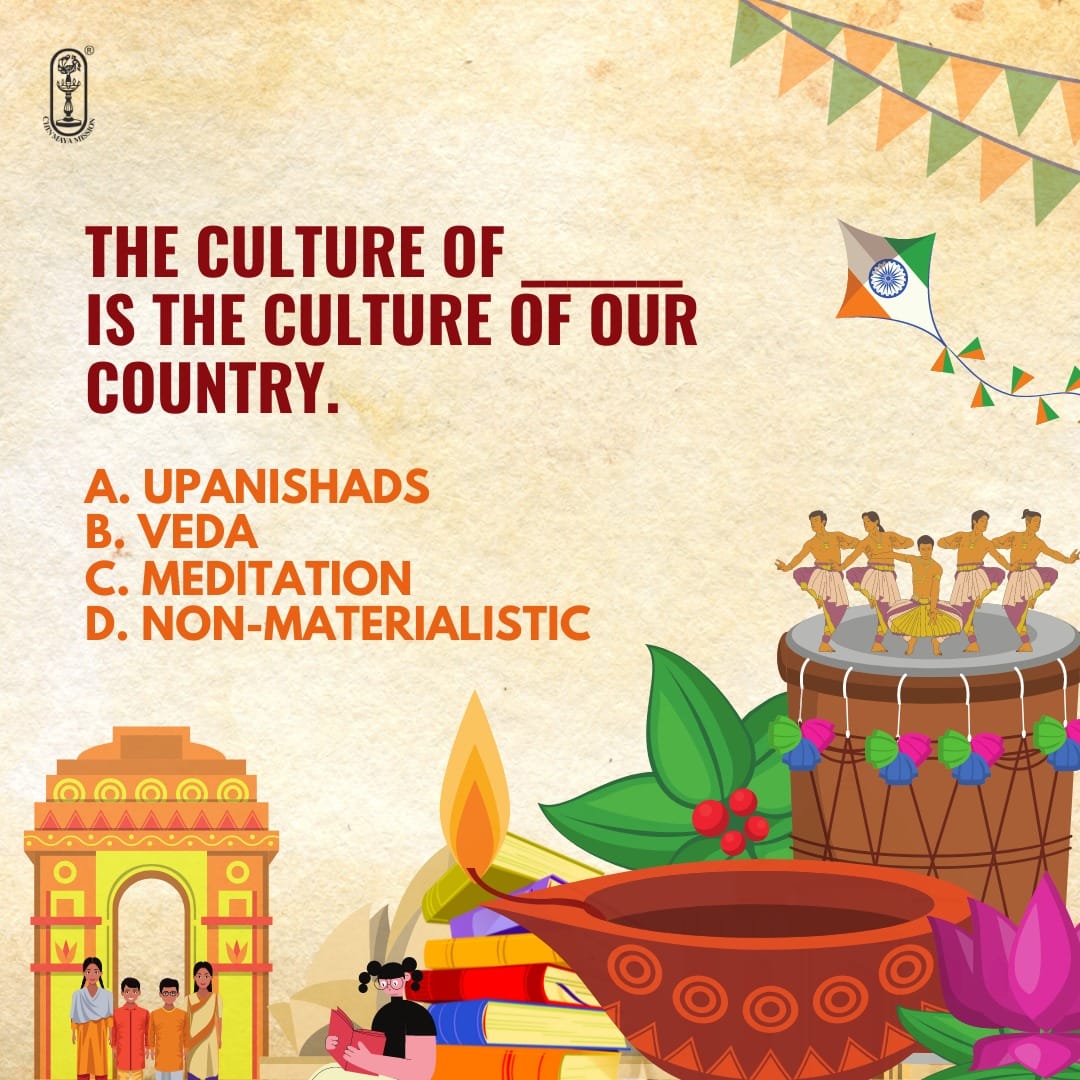On the Concept of Righteousness and Justice : 4. Swami Krishnananda
----------------------------------------------------------------------------------------------------------------------
# OPINION : Monday, February 15, 2021. 07:18. AM. 2321.
Sub : On the Concept of Righteousness and Justice : 4. Swami Krishnananda
----------------------------------------------------------------------------------------------------------------------
Ref - CHILDREN IN BHARATHAM, ARE MISGUIDED BY INDISCIPLINE AND RUBBISH STUDENT ASSOCIATIONS AND STUDENT POLITICAL WINGS, ENDING IN LOSS OF CHARACTER! Elections in Bharatiya states are near, Here is chance to eliminate such demonic political parties from this Holy Earth!! : MEMBERS READ CAREFULLY, HERE THE TATTVAM/ESSENCE IS VERY STRONG, KEEP THIS TATTVAM IN YOUR MIND, IN THE NEXT EDITION YOU WILL FIND MORE OF THIS KIND"
-----------------------------------------------------------------------------------------------
All Members,
Respected family members of this great holy Nation.
REQUEST ALL STUDENTS, PARENTS AND TEACHERS MUST READ THIS TOPIC.
IT IS URGENT IMPORTANCE IN THE PRESENT SITUATION OF THE NATION
-------------------------------------------------------------------------------------------
The perfection that is wholeness, which characterises every stage of evolution, is also to be equally active in the administrative, political and judicial field of human management. The question of management arises practically from the very level of the individual. Management does not necessarily mean a handling of relationship with other people. It is also a matter which concerns oneself. Self-management, or the proper handling of one's own self, will be found to be of primary importance even when considering one's relationship with other persons. The individual, as was observed, is also an organisation that needs to be managed. Any non-alignment of factors involved in personal management may land the person in a state of mental restlessness, whimsical behaviour, erratic conduct, and a bungling in the handling of any matter whatsoever. While human society is a group of human beings, it cannot be forgotten that it is human beings as individuals that constitute the society. There cannot be a factual qualitative superiority of a society whose constituent members do not possess in their own person the expected quality. But the very necessity felt to form a society, an administrative system, a government, or a judiciary should naturally be suggestive of an imperative involved in the outlook of anyone to exceed the narrow limits of a purely personal or individual concern and entertain an outlook which would not exclude from its purview the welfare or interest of any other person in the society. This is a specific requirement on the part of anyone who is placed at the helm of affairs in any organisation – social, political or judicial. The head of such an organisation, whether he is a king or a monarch, president, minister or judge, naturally requires a specialised form of education in being able to understand his relationship to the organisation of which he is the chief, a relationship which is not a particularised connection with individual members merely, but a superior relation to the spirit of the organisation, a welfare state, as one may designate it, which is not a person but a principle. From this it would also be clear that the head of such an organisation cannot look upon himself as a person, but the representation of a universalised principle which is the integrated welfare of the entire jurisdiction over which he has authority and responsibility. It would require some specific educational calibre and a stretch of some genius to realise that the head of a managemental system, social, political or judicial, is not a person, but a super-personal general principle. A judge in a court, for instance, does not only transcend the limitations of the clients of the cases, but transcends even himself as a person. The judge is neither anyone of the clients or advocates, nor the visible person seated on the chair. The judge is an embodied representation of law, which by itself is impersonal. Hence, the true judiciary is not visible to the eyes but can only be appreciated through reason which has a wider jurisdiction than any person or even all persons. It is in this sense that a ruler is often considered as a representation of divinity, a deity in himself. It is so because the ruler is a principle of wholeness which, in every one of its levels, enshrines perfection which is godliness, which is a name for the soul or the self-integrating principle in anything.
The above consideration would also in a way enable one to answer the question as to whether the individual is for the State or the State is for the individual. The controversy seems to be finally unfounded, arisen due to a misconception of the relationship between the individual and the State. To bring the instance of the judiciary once again, the client, the lawyer and the judge form a single cooperative network in the act of bringing about legal and social balance in the jurisdiction of the people concerned, and the unit constitutes a whole, each member forming a necessary contributory part of the whole, and the whole in turn deciding the status of each of such participating parts. The individual exists for the State, because the individual, as a lesser whole, is a constitutive element in the larger whole which is the State. But the State exists for the individual, since the integral wholeness which is the State cannot afford to interfere with the progressive welfare of any of the lesser wholes, insofar as the lesser wholes do not contradict or clash with one another's welfare. So, both the views stand the test of tenability, for they are actually not two viewpoints but two phases of a single point of view, which is the consideration of the entire State as a final whole which is at once inclusive of all the lesser wholes within it forming its inner constituents. This also answers the other question sometimes raised, that both the State and the individual are equally important. The point, however, is that the two are not distinct entities at all.
The administrative and legal issues of life, while they essentially constitute an operation of positive and constructive remedying and equitable healing forces in the organisation, also involve a sometimes unavoidable factor known as punitive justice. Criminal laws engage themselves in this latter aspect of the management of human affairs and in the act known as punishment inflicted by law, the social welfare of the organism is supposed to be ensured. The positive side of legal justice mainly concerns itself with the distribution of property and the question of its ownership in society: the civil rights of the people. Though, even in an act of civil dispensation of justice, an element of punishment may be said to be involved, where, for example, a landed property wrongly appropriated by a person is wrenched out from him and handed over to its rightful owner, based on the principle of equity and welfare of the entire organism of administration; yet, in what is known specially criminal procedure, the punitive aspect puts on an accentuated form as a special kind of pain inflicted on the wrong-doer. It has been held even in a free state or a democracy, where private property is conceded, that all ownership is more a kind of trusteeship and the State can have the right, and has actually the right, to own the entire property under given conditions. In fact, private ownership cannot defy or contravene public welfare or the well-being of the State as a whole. All this means that no one exists for himself alone, but everyone exists for everyone else, also. Here comes into high relief the great spiritual significance of life operating powerfully even in political and judicial administration.
---------------------------------------------------------------------------------------------------
NOTE :
1. You are following a wrong path even in your studies and educational career; and neither your parents, your government, your society nor your friends are good enough or intelligent enough to tell you what your problems are going to be when you become an adult!
2. "Here comes the need for a new type of education. You may call it Sanatana Dharmam."
THIS IS WHAT NOT HAPPENING IN THE MUSLIM WORLD,
THEIR POISONOUS MADRASA EDUCATION, IS FUNDING HATRED, VIOLENCE, MENTAL DISTURBANCE, CREATING TROUBLES AMONG THEMSELVES AND OTHER COUNTRIES!!
3. Nature can suddenly burst a bomb on the head of all humanity, which she has been keeping secretly tucked under the arm because the time for it has not come. The whole Earth can shake, and the matter ends there in one second!!
4. THE BREAKING INDIA FORCES CONGRESS AND COMMUNISTS ALONG WITH ALL REGIONAL DYNASY/INE MAN LEAD DEMONIC POLITICS; VOTE BANK POLITICS WITH MUSLIMS AND CRISTIANS ASSOCITED WITH ABOVE SAID POLITICAL COMBINATIONS DESTROY THIS HOLY NATION.
5.TO STOP THESE EVIL MOB IN THE PRESENT DAY, ONLY WAY TO IT BE RIGHTEOUS, TRUE TO ONE NATION AND ONE PEOPLE PRICIPLE.
6. TODAY IN KERALA AS WELL AS OTHER PARTS OF THIS HOLY NATION, WHERE GREAT BRAHMA RISHIS, MAHARISHIS TOOK BIRTH AND GVE US GREAT TEXTS, FOLLOWED BY GREAT ACHARYA SRI SWAMY ADI SANKARACHARYA AND MANY MORE BORN AND SUCCEEDED IN ESTABLISHING A STRONG SANATANA DHARMAM THROUGH OUT BHARATHAM; NOT PREPARED TO FOLLOW THEIR TEXTS AND SEVE THIS NATION, NEED TO CHANGE THIS TENDENCY BY RENAISSANCE.
=======================================================================
To be continued ....
JAY HIND
JAY BHARATHAM
VANDE MATARAM
BHARAT MATA KI JAY
=======================================================================





Comments